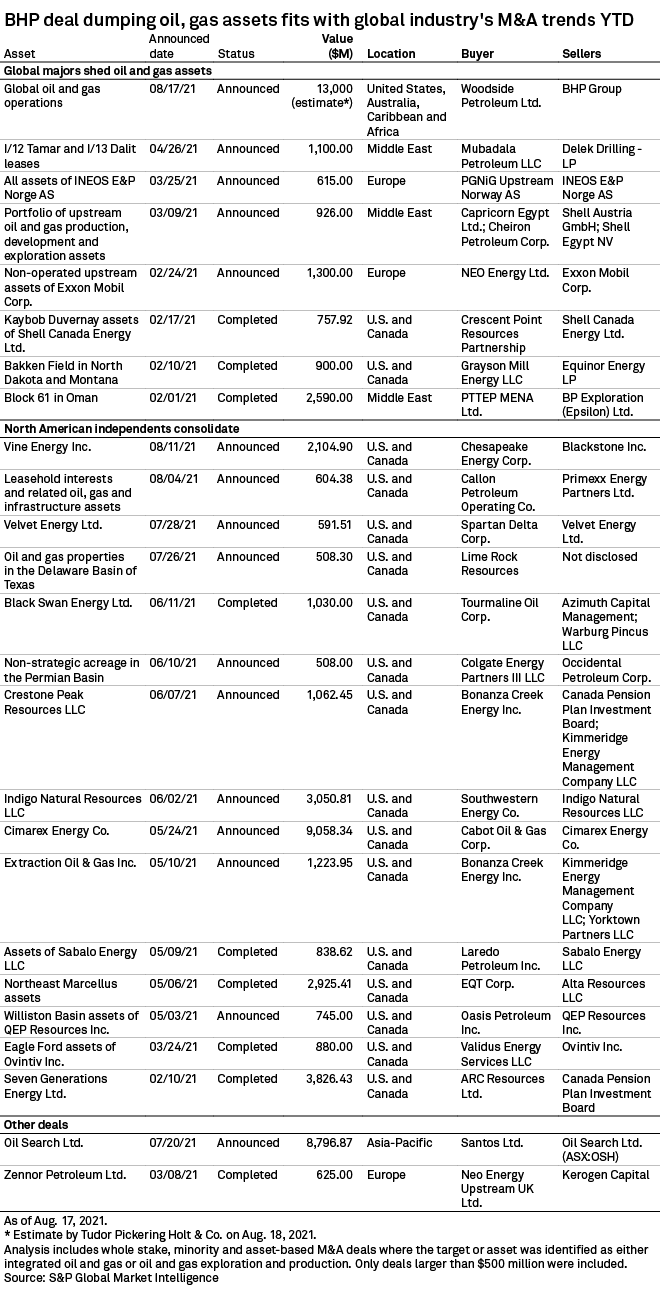Global oil companies are reducing their greenhouse gas emissions profiles by selling off their carbon-intensive assets, an S&P Global Market Intelligence analysis of M&A data found Aug. 19.
In the U.S., the M&A train runs on the opposite track. U.S. independent exploration and production companies, or E&Ps, are buying up rivals and neighbors to consolidate their oil and gas positions, especially inside plays from Pennsylvania's Marcellus Shale to Texas' Permian Basin.
According to Market Intelligence's data on global oil and gas deals, large international oil and gas companies selling assets to smaller firms accounted for just over 35% of estimated oil and gas deal value in 2021. Deals by independent U.S. E&Ps to add more oil and gas assets to their holdings accounted for roughly half of total deal value.
Latest example
BHP Group's Aug. 17 decision to sell its oil and gas operations to Woodside Petroleum Ltd. is the latest and largest deal in which a global company has opted out of fossil fuels. BHP said it plans to navigate the new energy future by returning to its roots as a mining company and churning out the iron, copper and nickel needed for the transition to renewable energy.

But given that BHP shareholders will end up owning 48% of Woodside's shares when the deal closes in the second quarter of next year, the break is not as clean as it seems, analysts said.
"Given its century-long history as fundamentally a mining company, BHP's oil and gas business has always been somewhat of an appendage," Pavel Molchanov, oil, gas and renewables analyst at Raymond James & Associates, said in an email. "The fact that BHP will become a major shareholder of an E&P company means that it still sees opportunity in oil and gas. If it were purely an [environmental, social and governance] consideration on its part, BHP would have exited oil and gas entirely."
The deal reduces risk at BHP and hands it off to Woodside, said Axel Dalman, oil and gas analyst at Carbon Tracker. Carbon Tracker is a London-based think tank that is analyzing the impact of the energy transition on the capital markets.
"The pivot away from fossil fuels makes a lot of strategic sense," Dalman said. "It'll be easier to motivate [capital expenditure] into metals mining than into new oil and gas fields to investors, and increasingly so over the next few years."
Role of gas
"Woodside isn't alone in being very bullish on gas, but that 'transition fuel' narrative is slowly being eroded by less convincing economics and an increasing possibility of emerging markets leapfrogging to renewables," Dalman added. "Claiming to build resilience by focusing on gas will soon start to ring hollow to investors, I think."
Prior to the deal, Australian activist group Market Forces urged BHP in a resolution to "manage down" rather than sell off its oil and gas assets, arguing at the time that a divestiture would not address possible reputational risk related to avoiding responsibility for employee transitions and site rehabilitation. Affiliated with Friends of the Earth, Market Forces characterizes itself as an environmental advocacy project focused on financial institutions. The resolution submitted by the group represents about 100 shareholders.
For Woodside's part, CEO and Managing Director Meg O'Neill said the company intends to stick to its promise to be a net-zero carbon emitter by 2050.
"BHP's Gulf of Mexico assets bring high-margin oil to the portfolio," O'Neill told analysts on an Aug. 17 conference call to discuss the deal. "The strong oil production is expected to generate significant cash in the coming years and help fund future growth and Woodside's investment in the energy transition."



